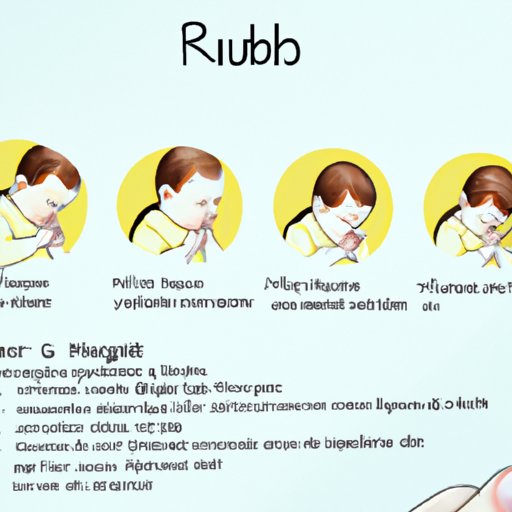Introduction
Thrush is a type of yeast infection caused by the fungus Candida albicans. It can affect any part of the body but is most commonly found in the mouth, throat, and genitals. While thrush can affect people of all ages, it is especially common in infants and young children. In this article, we’ll explore how a baby can get thrush and what parents need to know about its causes, symptoms, and treatments.
Examining the Causes and Symptoms of Thrush in Babies
Thrush is often caused by an imbalance of the natural bacteria in the body. This imbalance can be caused by taking antibiotics, being exposed to certain chemicals, or having a weakened immune system. Babies can also be more susceptible to thrush if they are born prematurely or have recently been in the hospital.
Common symptoms of thrush in babies include white patches in the mouth, difficulty feeding, and fussiness. Other symptoms may include redness or soreness in the mouth, a yellowish coating on the tongue, and diaper rash. If these symptoms are present, it’s important to seek medical attention right away.
Treating Thrush in Infants – What Parents Need to Know
If your baby has been diagnosed with thrush, there are several treatment options available. Your doctor may prescribe antifungal medications, such as nystatin or clotrimazole. These medications are usually taken orally or applied directly to the affected area. In some cases, your doctor may also recommend a probiotic to help restore the balance of beneficial bacteria in your baby’s body.
In addition to medication, there are also several things you can do at home to help manage your baby’s symptoms. Make sure to keep your baby’s mouth clean by brushing their gums and tongue after every feeding. You can also give your baby warm saltwater baths to help reduce irritation and discomfort. Finally, it’s important to practice good hygiene habits, such as washing your hands before and after handling your baby.

Understanding the Risk Factors for Thrush in Babies
There are several potential risk factors for thrush in babies. These include having a weakened immune system, being exposed to certain chemicals, or having a mother who had a yeast infection while pregnant. Additionally, babies who take antibiotics or are bottle-fed are more likely to develop thrush.
To help reduce the risk of thrush in babies, it’s important to practice good hygiene habits. Wash your hands regularly, avoid sharing utensils, and make sure to clean pacifiers and bottles after each use. Additionally, it’s important to change diapers frequently and to treat any diaper rash promptly.

Exploring Natural Remedies for Thrush in Babies
In addition to medical treatments, there are several natural remedies that may help relieve the symptoms of thrush in babies. One popular remedy is to mix one tablespoon of apple cider vinegar with one cup of warm water and use it as a mouthwash. Another remedy is to mix a few drops of tea tree oil with a tablespoon of coconut oil and apply it to the affected area. Additionally, applying a cold compress to the affected area may help soothe any discomfort.

Maintaining Good Hygiene Practices to Prevent Thrush in Babies
Good hygiene practices are essential for preventing thrush in babies. Make sure to wash your hands before and after handling your baby and avoid sharing utensils or other items. Additionally, keep your baby’s environment clean by changing diapers frequently and treating any diaper rash promptly. Finally, make sure to brush your baby’s teeth after every feeding to remove any food particles that may cause infection.
Conclusion
Thrush is a common infection that can affect babies, but it is easily treatable. To prevent thrush in babies, it’s important to understand the causes and risk factors, as well as practice good hygiene habits. Additionally, there are several natural remedies that may help relieve the symptoms of thrush in babies. By understanding how a baby can get thrush, parents can take the necessary steps to protect their little ones.
(Note: Is this article not meeting your expectations? Do you have knowledge or insights to share? Unlock new opportunities and expand your reach by joining our authors team. Click Registration to join us and share your expertise with our readers.)
